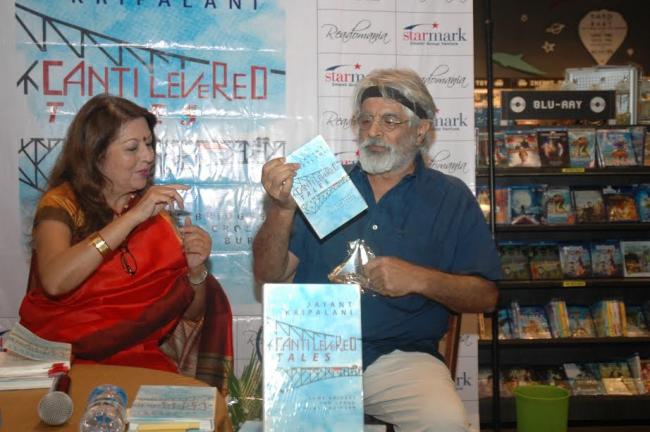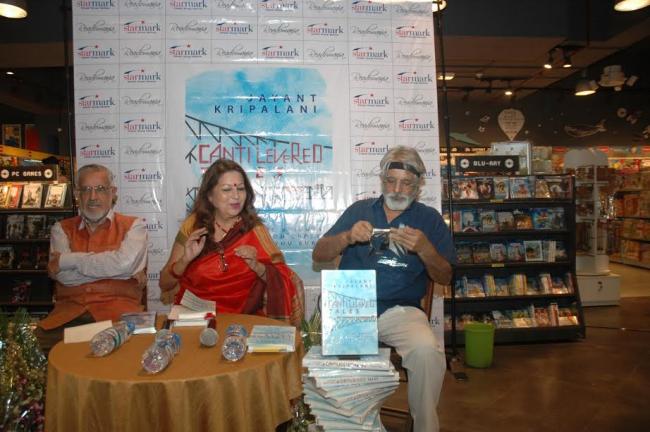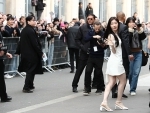
My stories are about real people, says veteran actor and author Jayant Kripalani
How would you sum up your book in a nutshell?
I find it hard to be serious about a question like this since it’s taken nigh on two years to write this book. If I answer in a nutshell, then I have to say ‘My book is nuts’.
What was the thought process behind this book? What was the inspiration?
I was on way my back from somewhere by train and at Howrah Station a group of taxi drivers tried to extort a higher fare from me. This was before the time of pre-paid taxi booths. Rather than shell out five times the fare, I thought I’d take a bus. It was peak hour in the morning and though I did get a seat since the bus started from there, I hadn’t calculated the length of time I’d be sitting in the bus on the bridge. Forty five minutes of inching along later I heard a voice behind me say, “Aita ki Haora Bridge na l**** Bridge?”
I knew exactly what he meant.
I knew then that I had the beginning for a story. I became friends with the man, got him to talk about himself and the tedium of his life. It might have been tedious for him. And that as they say was the beginning of a beautiful friendship. His name was Khokon. He lived in Santragachhi. And because of that immortal first line, I called the protagonist of my story Khokon. In the book though, the line belongs to his colleague Ashutosh.
Sometime later, I overheard a group of people talking about saving a water body from some unscrupulous builder. I started keeping tabs on them. Not because I was interested in saving the environment or even that small little lake. I am not a crusader. I hate getting involved with issues. But if you live in Calcutta, even for a short while, trust me, you’ll get involved.
What did interest me were the disparate lot of people, and some desperate ones among them, who were determined they were going to save a stagnant water body from becoming an office complex. Frankly in my opinion that lake had outlived its usefulness to be anything at all. I didn’t give a damn what happened to the lake.
But over a period of time I did start worrying about the people. And of course fell hopelessly in love with them. Their wellbeing and their good health became a matter of great concern to me especially since I saw the array of ‘villains’ lined up against them.
So rather than concentrate on ‘Builder v Helpless Citizen’ – enough stories had been written about them, I concentrated on their stories and their histories.
This is their story or should I say these are their stories. Some of the people are real; some of the people who come to their assistance are thinly disguised caricatures of people I admire; some are just people I met on buses and trams in my journeys across the bridge who wormed their way into the book.
 Which portion in the book is your favourite, yet was the most challenging to pen down?
Which portion in the book is your favourite, yet was the most challenging to pen down?
I love all the stories in the book. And the people who make them. Chingdi Kaka’s back story was the most challenging since the person on whom Chingdi is based didn’t say much. Getting a sentence out of him was like extracting a tooth. Only in this case it was painful for the dentist. Me. He was a taciturn b****** and didn’t trust anybody. And I can understand why.
An author I recently spoke to mentioned that the biggest challenge of writing is to keep at it, to pick up from where it's been left off. Did you face that too?
No. There are a number of things one does everyday. Writing is one of those things. I keep a notebook with me. Jot down a thought here, an incident there, which somehow find their way into the story.
Do you have any literary inspirations in terms of writers /poets?
I guess I do. If I could sing and dance and play an instrument, I’d eschew writing and go around the word telling stories, performing them. So I guess I have been inspired by the old ‘katha’ tradition. Unfortunately, I can’t hold a note, or play an instrument and I have two left feet so that puts paid to any plans or dreams I have of being a travelling story teller. So you’re going to have to read the book you poor fellow.
Also, do you feel that in this age of social media and technology, reading books has perhaps taken a backseat?
More books are being published and sold than ever before.
On a personal note, you've had a most fulfilling career of an actor cum theatre personality cum author. How do you look back at this journey?
Back? What excites me is what’s going to happen in the next minute, the next hour, tomorrow. I look forward to the unexpectedness of the future. My history is boring.
How has the entertainment industry changed from when you started out to now?
Dramatically. The evidence is there for all to see. Go on You Tube. See and listen to the entertainment of yesteryears. And of today. Music, art, writing, drama, if they didn’t change and reflect their time, we’d be wallowing in a sludge of sameness.
What's next after this book?
When it happens I’ll tell you.
And finally, what is an off day like for you?
What’s a working day?
(Reporting by Tanushree Sen)
Support Our Journalism
We cannot do without you.. your contribution supports unbiased journalism
IBNS is not driven by any ism- not wokeism, not racism, not skewed secularism, not hyper right-wing or left liberal ideals, nor by any hardline religious beliefs or hyper nationalism. We want to serve you good old objective news, as they are. We do not judge or preach. We let people decide for themselves. We only try to present factual and well-sourced news.







